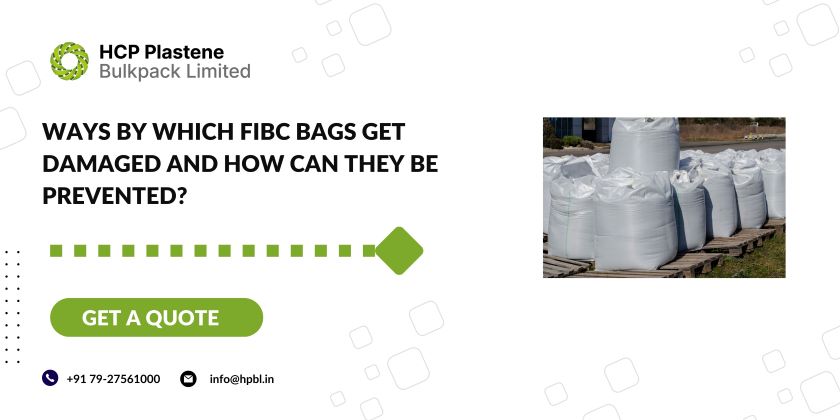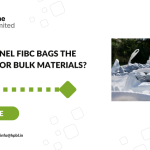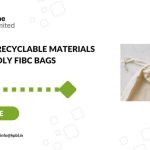FIBCs are environmentally beneficial options for bulk packaging that are capable of carrying large weights. These bags are the most popular logistics-based packaging solutions worldwide because of their adaptable packaging and storage components. But even these robust bags made by the FIBC bags manufacturer in India are not unbreakable and are susceptible to damage from a number of sources. It is essential to understand these risks and put appropriate preventative measures in place if you want to guarantee the durability and integrity of your FIBC bags.
HPBL offers high-quality FIBC bags and works closely with clients to ensure proper use and storage to maximize bag lifespan and protect valuable products. Here’s a breakdown of common damage factors and HPBL’s recommendations for prevention:
Environmental Factors
Sun Damage:
Prolonged sun exposure can degrade the polypropylene fabric in FIBC bags, reducing strength, flexibility, and lifespan. HPBL offers FIBC bags made with UV-protected fabric or can advise on shading solutions during storage or transport.
Moisture Damage:
Excessive moisture from rain or high humidity can weaken the fabric and seams of FIBC bags. We recommend storing bags indoors, especially in damp conditions, and ensuring proper drainage to avoid moisture build-up.
Wind Damage:
Strong winds can cause FIBC bags to scrape against each other or sharp surfaces, leading to punctures or tears. We suggests secure stacking practices and avoiding locations prone to high winds or flying debris.
Overfilling and Rough Handling
Safe Working Load (SWL) Limits:
Each FIBC bag has a designated SWL, the maximum weight it can safely support. Exceeding the SWL can stress the fabric and seams, causing rips and product spills. HPBL emphasizes adhering to SWL guidelines and avoiding overfilling.
Rough Handling:
Throwing, pulling, or dropping FIBC bags can tear the seams and fabric. We recommend using proper lifting techniques and equipment for safe transportation and avoiding rough handling.
Sharp Objects:
Sharp objects like knives, forks, or protruding metal can easily puncture FIBC bags. We advise caution when handling such items around the bags.
Chemical Reactions
Chemical Compatibility:
The polypropylene fabric in FIBC bags may react with certain chemicals, causing deterioration and potentially hazardous situations. HPBL ensures clear communication about compatibility and can help you choose the appropriate FIBC bag for your specific product.
Static Electricity:
Filling or handling FIBC bags can generate static electricity, which could ignite flammable materials. HPBL recommends grounding the bags during filling and taking steps to dissipate static electricity before handling them near combustible materials.
Temperature Extremes
Heat and Cold Exposure:
While FIBC bags are designed to withstand a variety of temperatures, prolonged exposure to extreme heat or cold can affect their strength and elasticity. We suggest storing FIBC bags in areas with moderate temperatures whenever possible.
Improper Storage and Maintenance
Stacking:
Improper stacking can cause uneven pressure distribution, potentially overloading and bursting the bottom bags. HPBL promotes proper stacking techniques that ensure adequate support for each bag.
Cleaning and Maintenance:
Over time, material residue from stored products can degrade FIBC bags. We recommend following a regular cleaning and maintenance schedule as advised by FIBC bag manufacturers in Gujarat.
Inspections:
Regularly checking FIBC bags for signs of wear and tear is crucial to prevent accidents or product loss. We recommend inspecting for holes, rips, weak seams, or other damage, and replacing or repairing damaged bags promptly.
By understanding these damage factors and following HPBL’s recommendations, you can significantly increase the lifespan and effectiveness of your FIBC bags. HPBL’s commitment to quality and customer service ensures you receive high-quality FIBC bags and the guidance to use them safely and efficiently.
Training & Awareness: A Crucial Element of FIBC Bag Longevity
Even with high-quality materials and manufacturing standards, the lifespan of FIBC bags largely depends on how they are used. That’s why at HPBL, we believe training and awareness are equally important. Many damages occur due to a lack of understanding or oversight during handling, filling, storing, or transporting bulk bags.
We work closely with our clients to provide comprehensive usage guidelines and on-site training (where applicable) to ensure their teams are well-equipped to manage the bags effectively. Simple precautions like avoiding dragging bags across rough surfaces or using forklift tines with smooth edges can make a significant difference in prolonging FIBC performance.
Tailored Solutions Based on Application
Not all FIBC bags are made for the same purpose. Whether you’re transporting fine powders, granules, or bulky construction material, HPBL can recommend a bag type suited to your specific needs. From Type A to Type D FIBC bags, we provide custom solutions with varying levels of electrostatic protection, barrier liners, dustproof stitching, and moisture resistance based on your product characteristics.
This tailored approach eliminates many common risks of damage caused by chemical incompatibility, static build-up, or moisture ingress.
Sustainability Considerations
Another important aspect is sustainability. Damaged or single-use bags increase environmental waste and operational costs. By investing in reusable, repairable, and recyclable FIBC bags, businesses can reduce their ecological footprint while improving bottom-line efficiency.
HPBL promotes sustainable practices by offering:
- Recyclable materials in bag construction
- Guidance on cleaning and reusing bags safely
- Responsible disposal and recycling instructions
These practices not only help protect the environment but also improve the cost-effectiveness of bulk packaging operations.
Final Thoughts
FIBC bags are a vital part of modern bulk packaging, but their full potential is only realised when they are handled and maintained with care. At HPBL, we don’t just deliver high-quality FIBC bags — we deliver peace of mind. With the right preventive measures and professional support, you can avoid unnecessary damage, ensure product safety, and extend the usability of every bag.










